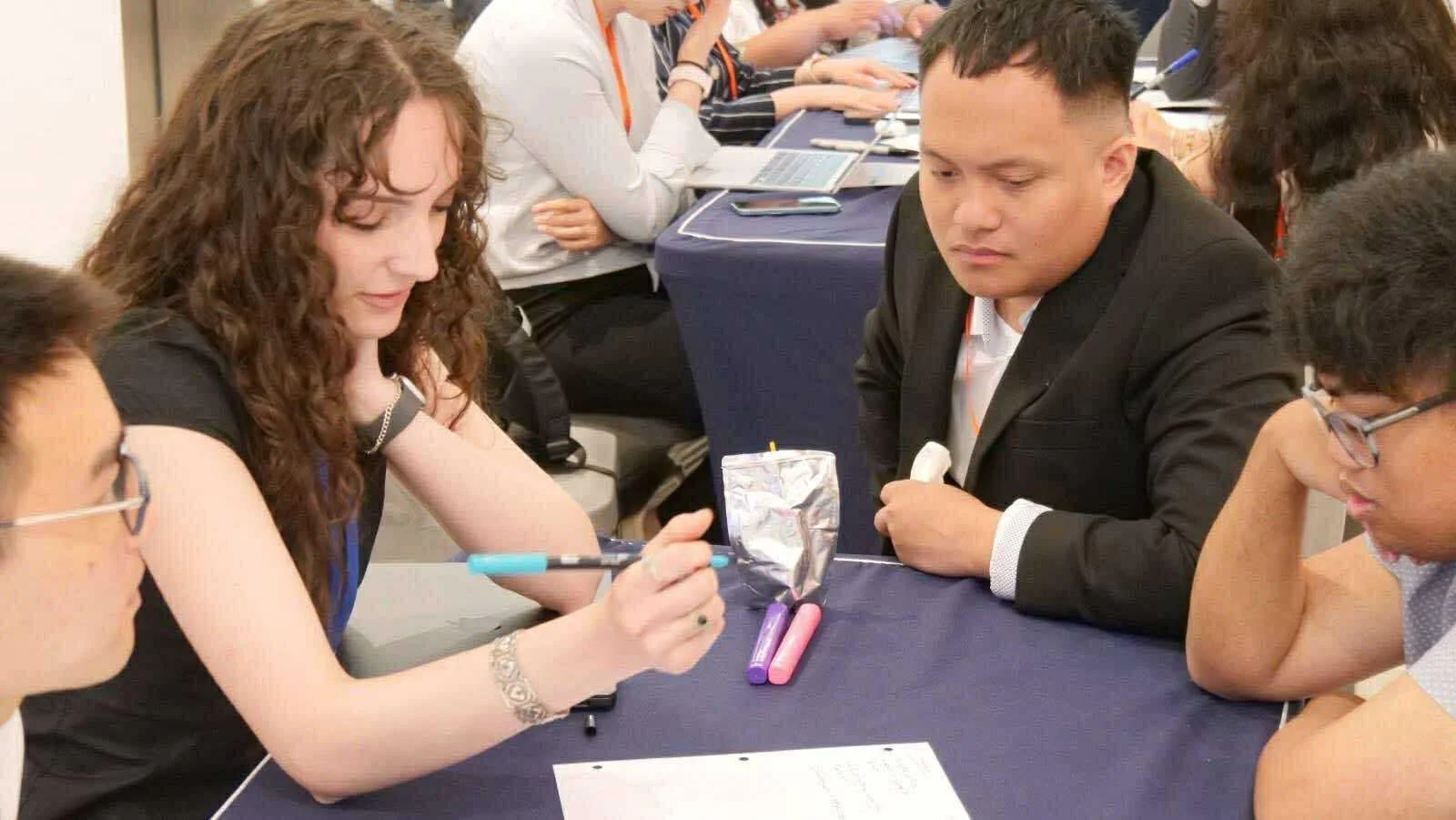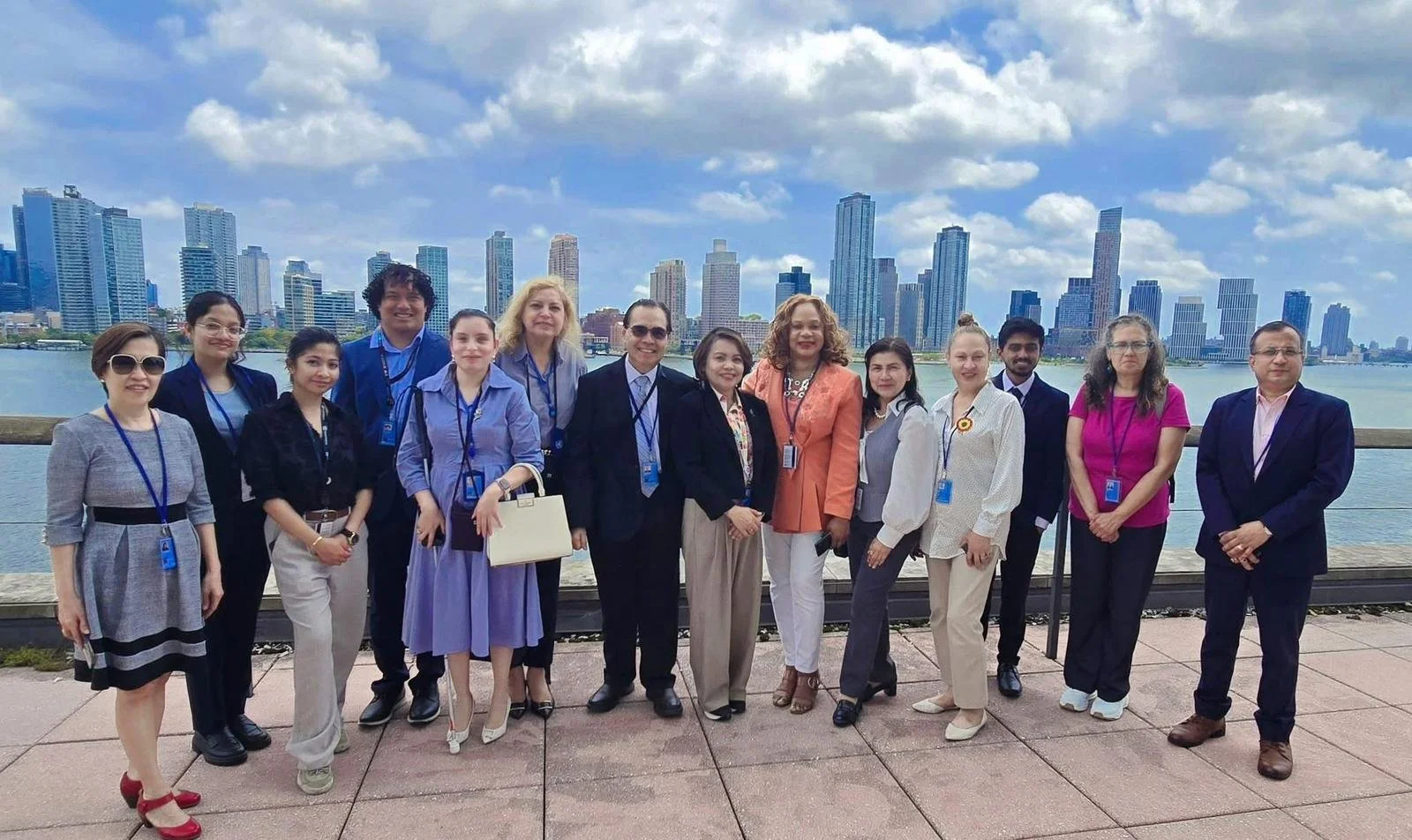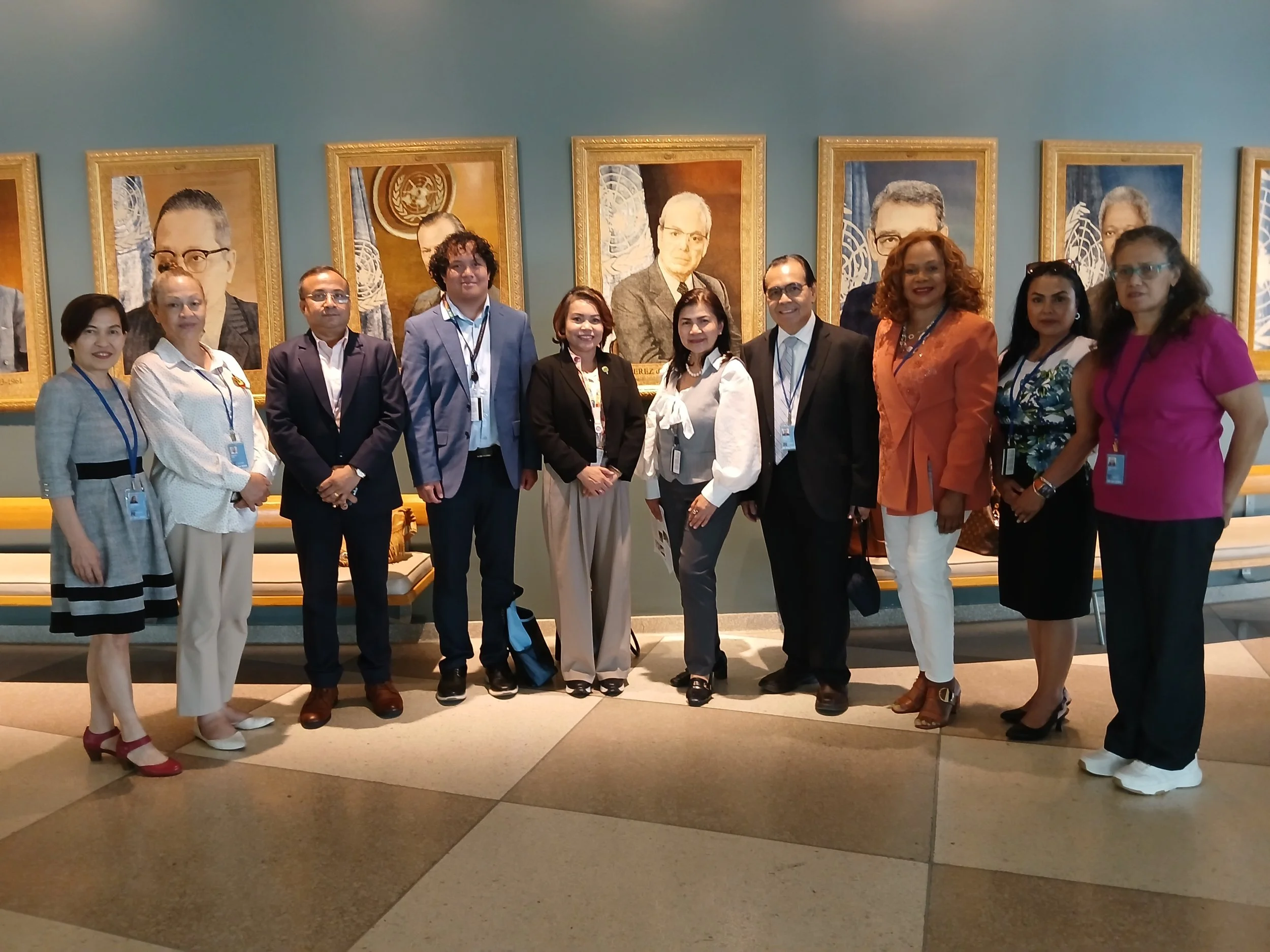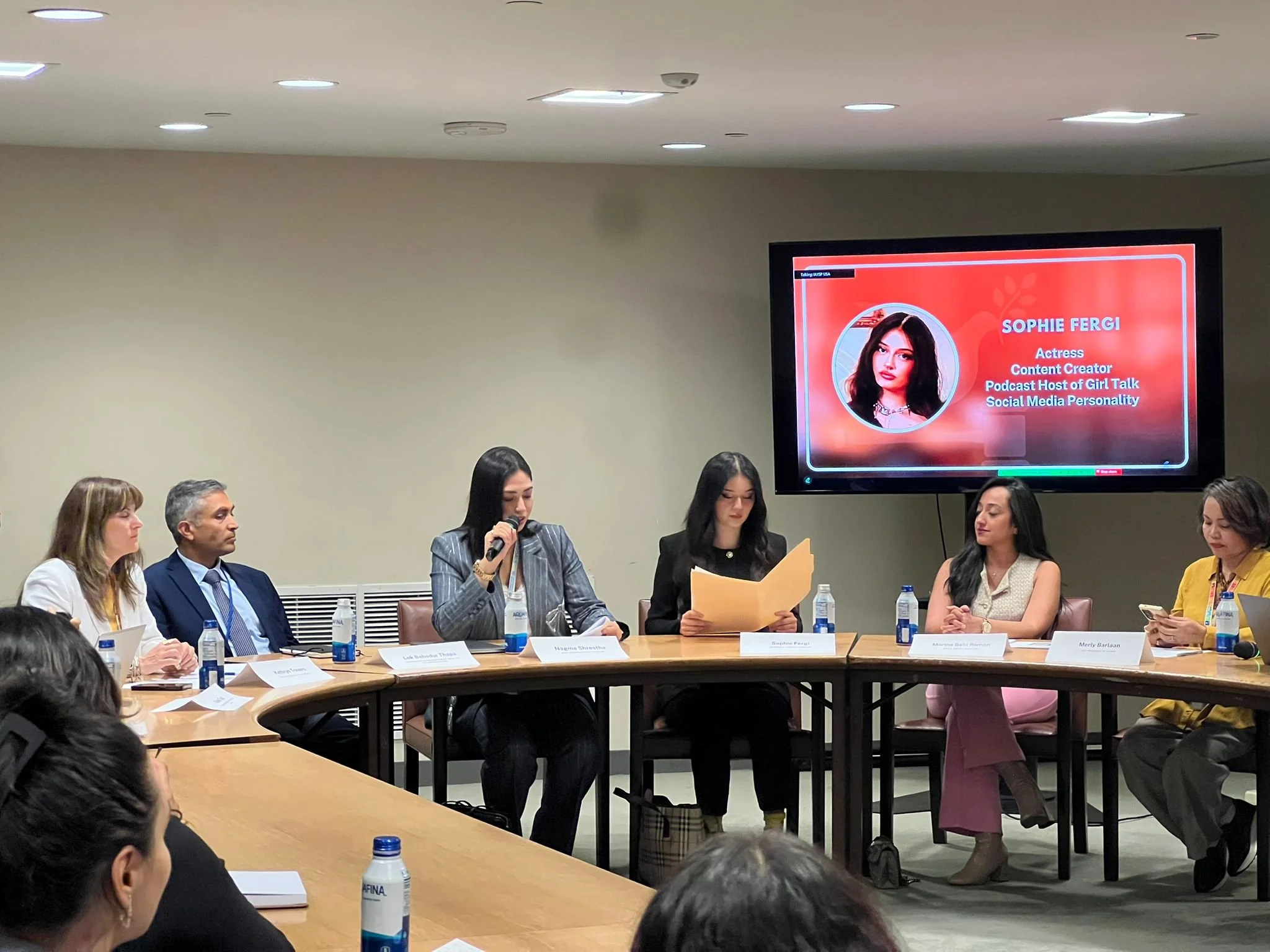UN Reps Attend 2025 HLPF, Cite Works Aligned with SDGs
By Amb. Mario de Leon Jr., Priscilla Garces, Akshay Sapkale, Yamcy Fleming, Arshia Dutta, Anupam Dutta, Rachel Beth Tamayo, Juliesette Hatulan, Dr. Elaine Duval, Dr. Maria Santiago-Valentin, Dr. Maria de Lourdes Guevara, Dr. Remi Alapo, and Dr. Marivir Montebon
New York – UN representatives of WFWPI attended the two-week High-Level Political Forum (HLPF) on Sustainable Development, led by UN Relations Director Merly Barlaan, mindful of how they are localizing UN’s Sustainable Development Goals, to bridge the gap between rhetoric and reality.
“We want to make sure that the representatives’ feet are on the ground while looking at the lofty SDGs,” quipped Barlaan, underscoring the mission of WFWP on women empowerment through the intertwined goals of gender equality, peacebuilding, economic development, and climate action.
The 2025 HLPF was a massive effort of the ECOSOC on July 14-23, 2025, at the UN New York. Themed on “Advancing Sustainable, Inclusive, and Evidence-Based Solutions for the 2030 Agenda – Leaving No One Behind,” the world forum opened with remarks by ECOSOC Vice President Lok Bahadur Thapa and keynote speeches from UN Deputy Secretary Amina J. Mohammed and Anatolio Ndong Mba.
At the outset, UN Under-Secretary-General for Economic and Social Affairs, Mr. Li Junhua, underscored the challenges ahead, noting that only 35% of SDG targets are on track, while 18% are regressing. This stark reality aligns with findings from the Financing for Development 4 (FfD4) fact sheet, which reported that major donor countries are providing, on average, only 0.37% of their Gross National Income (GNI) as Official Development Assistance (ODA)—well below the 0.7% target needed to finance the SDGs effectively.
This year’s in-depth review focused on the following five Sustainable Development Goals (SDGs) - SDG 3: Good Health and Well-being; SDG 5: Gender Equality; SDG 8: Decent Work and Economic Growth; SDG 14: Life Below Water; and SDG 17: Partnerships for the Goals.
The world forum featured 187 side events, 13 Voluntary National Review Laboratories, 12 special events, and 15 exhibitions that showcased innovative partnerships, policies, and community-driven solutions.
Numerous interventions by member states and civil society organizations emphasized to prioritize the needs of underserved and marginalized populations, reaffirming the Ministerial Declaration’s pledge to “leave no one behind.” Several speakers also emphasized that gender equality (SDG 5) is foundational to progress on all other SDGs under review.
Taking care of the family
Youth organizations at the UN have created a side event that impedes the implementation of SDGs.
On July 15, WFWPI co-sponsored the side event titled “Sexual Harassment as a Barrier to Achieving the SDGs” which was organized by the International Association of Youth and Students for Peace, and the Major Group for Children and Youth.
Barlaan was one of the panelists who wrapped the forum with a thought-provoking call to action for the UN member states.
She proposed to focus on empowering the mothers and families by “integrating holistic family-building education into national curricula—with the same seriousness and investment given to STEM education; creating certification programs in marriage preparation and parenting, accessible to all couples before entering family life; funding community-based family education centers, particularly in rural and underserved areas, as part of national development and gender protection strategies, and including families as central stakeholders in the whole-of-nation approach to violence prevention, peacebuilding, and moral leadership.”
WFWPI’s “Family as the School of Love” education programs integrate family-building, nation-building and peace building as the blueprint to a sustainable world peace where women and girls are safe and protected.
UN Representative Priscilla Garces shared on the heightened vulnerability of people with disabilities for sexual and work-place harassment and advocated for inclusive, accessible prevention strategies during the forum.
Garces’ work is localized disability rights advocacy, inclusive education, and employment equity which aligns with the SDGs on quality education, gender equality, decent work and economic growth, and reduced inequalities (SDG 4,5,8, and 10).
“I advocated for New Jersey’s Workability Policy, launched January 2022, which allows individuals with disabilities to maintain Medicaid benefits while pursuing meaningful employment—advancing economic inclusion and healthcare access.”
Garces said that her recent initiative of sharing her experience navigating the complexities of the healthcare system as a visually impaired woman resulted in recognition by members of Congress and by Insider NJ, a policy advocacy media.
“My policy advocacy efforts led to being ranked high on the list of top 100 policymakers for 3 consecutive years,” she quipped.
Climate Action
The WFWPI attended the side event “China’s Two-Mountains Theory for Advancing Sustainable Development,” on July 14 which highlighted sustainable resource use, green economic models, scientific innovation, and international cooperation. It was jointly organized by the UN DESA and the Permanent Mission of China to the UN.
“The side event further informed and inspired my ongoing work by emphasizing the essential partnership between ecological preservation and economic growth,” wrote WFWPI UN rep Dr. Maria del Carmen Santiago-Valentin.
Actively involved in the New Jersey Progressive Environmental and Energy Coalition (NJPEEC) and the Franklin Environmental Commission, Santiago-Valentin has intentionally localized SDGs such as Quality Education (SDG 4), Affordable and Clean Energy (SDG 7), Sustainable Cities and Communities (SDG 11), Climate Action (SDG 13), and Partnerships for the Goals (SDG 17).
“Our coalition organizes local forums, educational workshops, and advocacy campaigns aimed at increasing community awareness and action on climate change, energy transition, and environmental equity. Our projects often involve greening public spaces, supporting local clean energy programs, facilitating tree-planting campaigns, and initiating dialogues on sustainable land use—all nurturing a holistic understanding of how environmental health underpins community prosperity,” she wrote.
For WFWPI intern Yamcy Fleming, experiencing the world forum was “eye opening.” The vigorous meetings of government officials, representatives of civil society, academe, and UN agencies show a stark contrast with the urgency for concerted action on the ground, “especially with a countdown of the time remaining to keep the planet below 1.5°C of global warming,” Fleming wrote.
He heads the permaculture project of WFWPI. “Our project is centered on the development of a permaculture garden, and educational tours are made to promote healthy lifestyles, food security, and environmental awareness. The permaculture project addresses both the prevention and promotion aspects of health. By reducing reliance on processed food and external supply chains, and encouraging active lifestyle, especially important in rural communities where public health infrastructure may be limited.”
Efforts are on the way to mainstream permaculture with the partnership of WFWPI and the academe in the Philippines in response to the UNGA’s resolution 76300 on humanity’s right to clean and sustainable environment.
UN representative Dr. Elaine Duval is looking to implement a collaborative permaculture project in Jamaica in 2026. The side event inspired her to explore organizational partnerships for localizing the SDGs through an urban redevelopment initiative in Kingston, the capital of Jamaica.
Financing for development
At the Voluntary National Reviews (VNRs) presented by 39 countries, a recurring concern across many reports was the inadequacy of ODA and limited domestic resources, which continue to hinder efforts to meet the 2030 targets. Countries widely acknowledged the need to operationalize and scale up the financing commitments agreed at FfD4 in Sevilla, Spain.
WFWPI intern Akshay Sapkale attended the side event “Feminist Perspectives on the Fourth International Conference on Financing for Development,” which focused on gender-responsive financing and structural reform in global economic governance.
He had a brief but enlightening conversation with Hana Brixi, Global Director for Gender at the World Bank, whose work on gender-focused financing and institutional reform strongly resonates with WFWP’s training goals.
“While our exchange was brief, I see strong potential for future collaboration with her office, particularly in aligning our modules with global strategies for gender equality and inclusive development.”
Sapkale is currently taking part in developing WFWPI’s National Leadership Training Modules. He leads sessions on Financial Management and Technology and Digital Presence, while also supporting the design and content development of the broader 13-module curriculum.
These modules contribute to Gender Equality (SDG 5) by equipping women leaders with financial literacy and digital skills, enhancing their decision-making power within communities. They also support Decent Work and Economic Growth (SDG 8) and Peace, Justice and Strong Institutions by promoting ethical financial practices, transparency, and effective communication strategies at the grassroots level (SDG 16).
Sapkale is also developing CiviCRM, a free and open-source constituent relationship management (CRM) platform for WFWP. While still in progress, this transition from fragmented systems to an integrated platform is designed to streamline donor tracking, volunteer management, and internal coordination—key factors in building resilient organizations.
The project aligns with Industry, Innovation and Infrastructure (SDG 9) and Partnerships for the Goals (SDG 17) by leveraging digital tools to professionalize our operations and increase our readiness for collaboration with government and private-sector partners.
Arshia Dutta, youth representative and WFWP intern, saw her participation in the HLPF as an opportunity for young people to be tapped to better articulate solutions to problems.
“As a representative for the WFWPI, a platform to represent and speak on behalf of my generation would've been a lot more effective and aided in the discussions that took place, possibly adding more important details.”
Dutta is currently developing a game app for WFWP that would teach users to develop a permaculture garden as part of its digital program for gender equality and regenerative food systems aligned with the UN resolution 76300 on the human right to clean and sustainable environment.
“I was able to talk to fellow inspirational delegates from different countries, including a student from Korea whose educational institute was presenting a sustainable solution for the lack of electricity in the world, especially places such as Sudan. The VNRs included some insightful statistics that were realistic to give a jolt to most delegates and promote them to ask intriguing questions,” Dutta remarked.
Literacy and character education for women
As gender equality is a non-negotiable goal in making things work and well-balanced on the ground, WFWP continues to implement empowering education and activities locally.
UN representative Dr. Maria de Lourdes Guevara focuses on localizing the SDGs through community initiatives that promote inclusion, women’s empowerment, quality education, intergenerational leadership, and social justice in her local Ecuadorian and Latin American communities.
She participates in social entrepreneurship programs for migrant women in New Jersey. It integrates leadership, education, cultural identity, and social equity that foster economic independence, civic participation, and community well-being that are aligned with poverty alleviation (SDG 1), quality education (SDG 4), gender equality (SDG 5), decent work and economic growth (SDG 8), and reduced inequalities (SDG 10).
As founder of the Ecuadorian Foundation for Social Support (FEES), Guevara led the humanitarian aid initiative during Christmas and Three Kings Day in 2025 for the Ecuadorian Andes (province of Chimborazo). This service project benefited over 150 children from rural and vulnerable families by promoting dignity, care, and unity throughout the community.
Women’s health and wellbeing
UN Representative Rachel Tamayo aligned SDG 3 goals on good health and wellbeing with her work at local level as president of JCI North Jersey, where she led youth-driven initiatives dedicated to strengthening community well-being.
“Our chapter has implemented programs that not only promote physical and mental health but also empower individuals to take an active role in shaping their futures. We have organized mental health advice sessions and seminars for both young adults and older adults, provided resources and referrals for those seeking professional support, and created safe spaces for open conversations on well-being.”
Her organization has also conducted women’s empowerment workshops, leadership and skills-development training for young professionals, and community outreach projects that connect people across cultural and generational lines.
UN representative Juliesette Hatulan said that her upcoming project will focus on the mental well-being of seniors in the care homes in New Jersey through education and activities.
Multilateralism in action
Maria Victoria Cabrera, CEO of the New York-based Global Network of Women Peacebuilders, addressed government officials and civil society leaders to continuously engage with each other to act.
“Now more than ever, multilateralism is needed. Each issue (we are facing) is interrelated and must be addressed by multi-stakeholders,” said Cabrera, referring to the pressing and overlapping concerns on poverty alleviation, gender equality, climate action, and peacebuilding which the ECOSOC is addressing in the next five years.
For WFWPI, multilateralism or multi-stakeholder approach is seen in the parallel event when it signed a memorandum of understanding with a Philippine university on July 23, for a joint project called “Mainstreaming Permaculture Education for Climate Action.”
Held at the New Yorker Hotel, the MOU addressed the issues on food security, environmental regeneration and action, youth and women empowerment, and economic development all in one.
WFWPI and Cebu Institute of Technology-University will implement a joint permaculture education program in Cebu City as a commitment to the right to clean, healthy, and sustainable environment (UNGA Resolution 76300).
In New York, UN Representative Dr. Remi Alapo said that in the coming semester, she would begin a school-based permaculture program as her localized climate action.
As an educator, Alapo has been actively institutionalizing education and cultural celebrations related to the SDGs.
“We have an active yearly International Day of Women event on campus in February and March where we raise awareness on women’s health, gender-based violence, community partnership and access to services that support young women's counseling for domestic or partner abuse.
We hold the 16 days of activism against gender-based violence on campus in November and December where I usually collaborate with the Women Resource Center to co-sponsor the program. Most times, I am the one that designs the event,” said Alapo.
CITU and WFWPI agreed to promote a joint education program on permaculture, implement at the community level regenerative food production systems, and build the capacity of local leaders and students to institutionalize permaculture education in the secondary and tertiary level of education of CIT-U.
WFWP also entered a strategic partnership – digital coordination with Headway BPO to enhance connectivity and coordination among its 128 chapters worldwide. The agreement, signed by Barlaan and UN representative Anupam Dutta, CEO of Headway BPO, leverages digital tools to expand WFWPI’s global outreach and operational efficiency.
As Amb. Mario de Leon Jr. WFWP Senior Adviser for diplomacy would put it, “The 2025 HLPF reflected both optimism and tension. While the adoption of the Ministerial Declaration demonstrated a shared commitment to sustainable development, the divided votes illustrated persistent geopolitical fractures. WFWPI’s strong presence and proactive engagement—in areas ranging from gender equity and climate education to digital empowerment and youth participation—underscore its growing influence as a civil society actor dedicated to bridging global priorities and declarations with local and community-driven action.”
Yamcy Fleming joins a side event Unleash Hacks, a leadership workshop for youth.
UN representatives of WFWPI
UN representatives Dr. Maria Santiago-Valentin and Priscilla Garces (middle) with Amb. Fu Cong, Permanent Representative of China to the UN.
Engr. Bernard Villamor and Merly Barlaan sign the MOU on mainstreaming permaculture in the Philippines.
Parallel event: WFWPI's mainstreaming permaculture
Amb. Mario de Leon and UN Rep Marivir Montebon, after an interview.
UN representatives after the opening of the 2025 HLPF on July 14, 2025.
Merly Barlaan, rightmost, in the panel of speakers for the side event 'Sexual Harassment as a Barrier in the Implementation of SDGs.' In attendance is ECOSOC VP Amb. Lok Bahadur Thapa, Permanent Representative of Nepal to the UN (2nd from left). The event was hosted by 2017 Miss Universe Nepal, Nagma Shresta of the International Association of Youth and Students for Peace.








